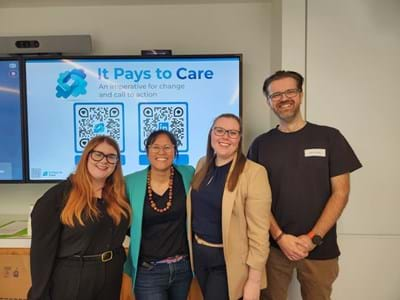20 May 2025 - a historic day for the It Pays to Care project and the national discussion on effective work injury management.
Kindly hosted at the Suncorp office in sunny Melbourne, the IPTC team launched not one but TWO brand new documents to support work injury management stakeholders deliver the highest quality outcomes for injured workers. IPTC wholeheartedly thanks our presenters and attendees - both in-person and online! The national discussion on fair, efficient compensation schemes relies on all of us coming together to move forward.
IPTC Messaging Matters: IECCC Framework
In the morning, we formally launched the Messaging Matters: IECCC Framework - a culmination of a year's consultation, collaboration and hard work. The Framework provides case managers with a tool that encourages more effective personalised care for better outcomes across the workers compensation schemes, offering a versatile and adaptable approach to promoting clear and compassionate communication. It invites a dialogue about psychosocial factors acknowledging that the health of the workers is priority, and places an emphasis on collaboration, cooperation, and coordination amongst all stakeholders.
The Framework is a tool designed to complement existing resources, guidelines and instruments. Organisations and individuals are encouraged to adapt and implement the Framework to suit their specific needs and contexts.
Early systematic psychosocial matched care for workers’ compensation schemes: A Best Practice Guide
In the afternoon, Dr Mary Wyatt took the stage with a team of collaborating experts to announce the new best practice guide for early psychosocial matched care. For too long, approaches to workers’ compensation have overlooked the psychosocial factors that impact work injury recovery. Research shows that psychosocial barriers, such as distress, workplace conflict, and poor self-efficacy, are among the leading contributors to prolonged disability and delayed return to work. Traditional injury management approaches fail to identify and intervene early in these cases, leading to higher costs, longer claims duration, and poorer health outcomes.
Psychosocial matched care is a structured approach that ensures interventions are tailored to individual workers based on their specific risk factors. Instead of a one-size-fits-all model, it systematically identifies workers at elevated psychosocial risk and delivers targeted counselling, workplace adjustments, and medical coordination to improve outcomes.
The team look forward to promoting the best practice guide further in coming months!




